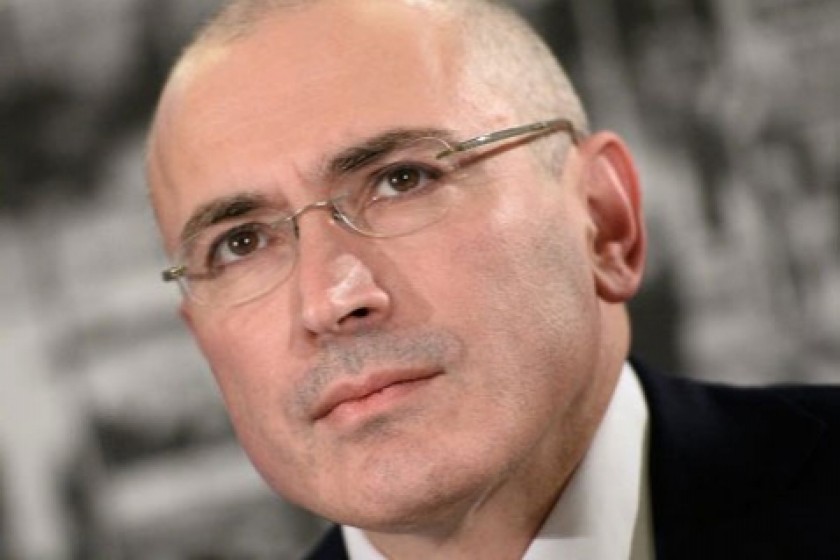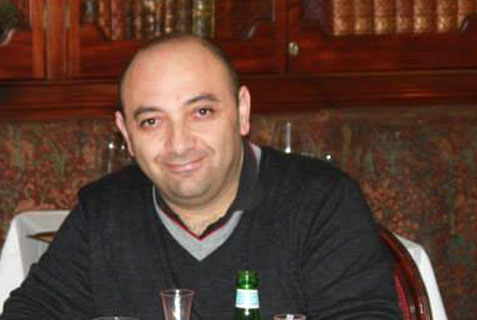
Khodorkovsky’s Legacy: The Battle for Yukos Oil Millions in Armenian Courts
The prominent Russian businessman Mikhail Khodorkovsky’s petroleum companyYukos Oil no longer exists.
But Yukos’ sister companies are still battling it out to “save” the monies of Khodorkovsky and his partners.
Khodorkovsky spent ten years in jail and was freed at the end of last year. He subsequently left Russia and is now trying to be granted residency status in Switzerland, where his family now lives.
Recently the Russian newspaper Vedomosti wrote that Khodorkovsky and his partners have insured millions of dollars with the sister companies and through them, have removed “petro dollars” from Russia. Of those companies, Yukos CIS Investment LLC (registered in Armenia) played a major role. It turns out that Yukos CIS Investment has founded other companies.
Yukos CIS Investment was founded in Armenian in 2002 and was registered at 10/1 Babayan Street. The director is Armen Mikayelyan. The company’s charter capital amounted to 560 million AMD (equivalent to US $ 1 million at the time).
Also registered at the same address is MLL Industries, LLC, which provides professional construction services. Its sole shareholder is Artur Mikayelyan, Armen Mikayelyan’s brother. The company was formerly known as Energatsantsshin CJSC. Together with J.A. Jones Construction, MLL Industries constructed of the US Embassy in Armenia. MLL has also won the tender to build a new oncology diagnostic center in Yerevan.
The Mikayelyan brothers are the sons of Energatsantsshin CJSC director Lavrenti Mikayelyan. Energatsantsshin used to belong to the energy ministry in Armenia, but Lavrenti Mikayelyan later privatized it. The company designs and builds hydro-electric plants and also works out of 10/1 Babayan Street. Lavrenti Mikayelyan also serves as chairman of the energy subcommittee at the Public Council’s Committee on Financial-Economic and Budgetary Affairs.
Yukos CIS Sister Companies
Yukos Hydrocarbons Investment Limited was a direct sister company of Yukos CIS. It too had founded other companies. After the arrest of Yukos Oil managers, Yukos Hydrocarbons underwent corporate restructuring. In Holland, Yukos CIS founded Wincanton Holdings BV. Shares of Yukos Hydrocarbons, included affiliated companies founded in the Virgin Islands (Fair Oaks and Glendale Group, among others), were then transferred to Wincanton. Later, Wincanton transferred the shares to Financial Performance Holding, a company it had created. The later then transferred the shares to the fund Stichting Administratiekantoor FPH. Thus, the Armenian Yukos lost its control over its sister holdings and the former danger that Rosneft would seize them disappeared. Nevertheless, in 2010 Rosneft was able to seize Vincanton via a court decision, but the sister companies were already under the control of Stichting Administratiekantoor FPH.
The above chart shows all the companies mentioned in the article. It will be completed in a subsequent installment.
The battle between Yukos and Rosneft in Armenia
In August 2006, Moscow’s Court of Arbitration decided to declare Yukos bankrupt. In August of the following year, Yukos shares were sold to Rosneft which also took control of Yukos CIS Investment shares; in addition to those of numerous other companies.
 While Khodorkovsky and his partners were in prison, various offshore companies (in Holland, Great Britain, the U.S. and Armenia) were attempting, via legal means, to get back millions of dollars worth of Yukos assets ‘seized’ by Rosneft, or at minimum, to prevent Rosneft from enveloping those companies.
While Khodorkovsky and his partners were in prison, various offshore companies (in Holland, Great Britain, the U.S. and Armenia) were attempting, via legal means, to get back millions of dollars worth of Yukos assets ‘seized’ by Rosneft, or at minimum, to prevent Rosneft from enveloping those companies.
A number of court cases took place throughout the entire Armenian judicial system in an attempt to prevent Khodorkovsky’s friends and his Armenian partners from taking control of capital invested by Rosneft in the Armenian company and in sister companies it founded. But these attempts proved futile. Scores of volumes of court case material are now archived in Armenia’s courts. When reviewing them, one is struck by the time and effort invested by Armenian representatives to translate and notarize the decisions of foreign courts and related powers of attorney and other documents in order to reach the above goal.
Episode 1
In October 2008, Yukos CIS Investment petitioned Armenia’s Administrative Court and demanded that it recognize as invalid the actions and documents of the agency registered in Armenia’s Foreign Ministry’s State Registry of Legal Entities, regarding the registration of Rosneft rights, Yukos CIS Investment shares and participants in the registry. The administrative court sustained the motion and authorized the following measures to ensure enactment – it prohibited the registration in the State Registry of the shareholder rights obtained by Rosneft. The court then halted the case since another suit (Episode 2) was being heard in the Kentron and Nork-Marash District Civil Court. Rosneft appealed the cessation decision. The appeal was rejected. The Court of Cassation reversed the rejection decision and Yukos also lost here.
Episode 2
At the end of 2008, Yukos CIS Investment also petitioned the Kentron and Nork-Marash District Civil Court, demanding that it recognize the portion of the Moscow auction buy and sale contract relating to the sale of shares as invalid, and that the rights and responsibilities of 100% of the charter capital of Yukos CIS Investment be transferred to the Armenian company. After going through all the courts, this suit as well was rejected.
Episode 3
In the summer of 2009, two other companies (Cyprus registered Moravel Investment Limited and Netherlands registered Yukos International UK B.V.) went to the courts with a separate suit.
In 2003, Yukos Oil signed a $1.6 billion loan contract with Société Générale S.A. (SocGen), the French multinational banking and financial services company headquartered in Paris. But in 2004, SocGen relinquished its claims to Moravel, a large shareholder in GML, the company that spawned of Yukos Oil. In Armenia, these companies had been demanding that the September 9, 2005 decision of the International Court of Arbitration in London be recognized, according to which Yukos Oil must pay Moravel $656 million – which, as of August 31, 2005, constituted the unpaid amount of the principal agreed to by the parties on September 30, 2003. This was in addition to $25 million (accrued interest and penalties) plus $155,000 and 45,000 Pound Sterling as compensation for arbitration expenses. The Arabkir and Kanaker-Zeytoun District Court, Judge Souren Ghazaryan presiding, sustained the suit and instructed that the decision be enforced throughout Armenia.
This meant that the representatives of Armenian Yukos CIS attempted not to lose the $1 million with the Moravel verdict, by having the decision of the London arbitration court enforced over all companies registered in Armenia and thus enacting a seizure.
Rosneft appealed and obtained a final verdict in its favor.
Episode 4 – with two actions
In 2004 and 2005, the managers of Yukos Oil created two Dutch stichting funds (a commonly used Dutch legal entity that has no members or shareholders. A stichting is created solely for the purpose of certain stated objects, as included in its objects clause). They were supposed to have defended the interests of Yukos sister companies and shareholders. The first, Stichting Administratiekantoor Yukos International was to mostly work in the defense of the interests of companies founded in Holland and affiliated companies. The second, Stichting Administratiekantoor Financial Performance Holding, was to defend the interests of the Armenian company and those supported by it, by consolidating the subsidiaries of Armenian Yukos. These funds were supposed to have also managed the assets of Yukos Oil subsidiaries outside Russia.
In the fall of 2009, three companies appear in an Armenian court, the above mentioned fund Stichting Administratiekantoor Financial Performance Holding , Luxtona Limited (as the shareholder of Yukos Oil, a right that was violated with the dissolution of Yukos), and Yukos International (as the former creditor of Yukos oil, since Moravel had transferred it power of attorney to it). At first, these three companies, along with Yukos CIS Investment and director Armen Mikayelyan, filed a suit as litigants at the administrate court and later, in the summer of 2010, to the Arabkir and Kanaker-Zeytoun Civil Court. They demanded that, regarding the company’s shares, the registration in Armenia’s Foreign Ministry Trade Registry regarding the property rights of Rosneft and the appointment of the new director be declared null and void and that all consequences thereof be removed. The civil court also rejected the suit. Appeals to higher courts failed to make any changes.
For the Armenian group companies, the battle rages on in foreign courts
 Yukos CIS director Armen Mikaelyan now resides in the U.S. In a conversation with Hetq he said that he didn’t want to answer any questions at this stage since cases linked to Yukos are ongoing in foreign courts.
Yukos CIS director Armen Mikaelyan now resides in the U.S. In a conversation with Hetq he said that he didn’t want to answer any questions at this stage since cases linked to Yukos are ongoing in foreign courts.
As noted, a number of Armenian Yukos subsidiaries are registered in the British Virgin Islands. Rosneft is trying to seize control of their assets in the courts there. But in August 2010, the courts rejected the Rosneft suit and instructed that it wait till the completion of the ongoing trial in Amsterdam.
Parallel to this, in 2010 Yukos CIS and Wincanton, already under the management of Rosneft, filed a new court case against the seven subsidiary companies of Vincanton. In this way, Rosneft attempted to liquidate the structure of the stichting fund that reached the Armenian Yukos subsidiaries. In the Amsterdam regional court they demanded that the inclusion of Consolidated Nile (and later General LLC) in the stichting fund structure be declared invalid. In May 2013, the Amsterdam court issued an interim verdict and allowed the stichting fund and the other companies to present evidence regarding the non-independent and partisan nature of the Armenian judicial system.
“Be patient” – the former judge remains silent
Armenian lawyers have attempted to prove that the bankruptcy trustee didn’t have the right to sell the shares of the company located in Armenia to Rosneft, since it was a company registered in Armenian. In their view, it was impossible to justify the evidence regarding the bankruptcy of Yukos Oil or the diving up of its capital via illegal means.
Yukos managers noted that Armenian courts were unable to issue properly reasoned judgments regarding the Yukos case and that this wasn’t a surprise given that it is impossible to describe Armenian court authorities as independent. “It is subject to major pressure from Armenia's executive branch, which is known to protect the interests of its neighbor Russia upon which Armenia is heavily reliant,” declared Yukos management.
This case is mentioned in 2011 and 2012 reports issued by the U.S. State Department; along with the name of former judge Souren Ghazaryan, who now resides in the U.S. The reports stress that Ghazaryan was pressured to issue the decision he did and that his dismissal was linked to the case. At first Ghazaryan agreed to talk to Hetq, but then balked. “I’ll give an interview later. Be patient,” was his answer.
At first glance, it would appear that the fight is over $1 million. In reality, the Armenian registered Yukos CIS is a key to reveal the other companies of Yukos and to control their capital and shares. And that capital is in the millions of dollars, as noted in the Yukos Library, a website that documents historic and often ground-breaking legal cases surrounding the Yukos Affair.
(To be continued)
 Videos
Videos Photos
Photos




Write a comment